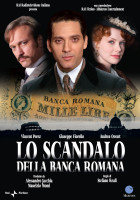Lo scandalo della Banca Romana Filming Locations

Where was Lo scandalo della Banca Romana filmed? Lo scandalo della Banca Romana was filmed in 3 locations across Serbia, Montenegro and Italy in the following places:
Lo scandalo della Banca Romana Filming Locations
Belgrade is the capital of the southeast European country of Serbia. Its most significant landmark is the Beogradska Tvrđava, an imposing fortress at the confluence of the Danube and the Sava rivers. The fort is a testament to the city’s strategic importance to the Roman, Byzantine, Ottoman, Serbian and Austrian empires, and it's now the site of several museums as well as Kalemegdan, a vast park.
Budva is a town in Montenegro on the Adriatic Sea. Part of the Budva Riviera, it's known for sandy beaches and nightlife. Stone walls built by the Venetians surround the narrow streets of the medieval old town (Stari Grad). This historic district is home to a seaside citadel and religious sites such as the Church of Santa Maria in Punta, established in the 9th century.
Rome is the capital city of Italy. It is also the capital of the Lazio region, the centre of the Metropolitan City of Rome Capital, and a special comune named Comune di Roma Capitale.
Lo scandalo della Banca Romana (2010)
Mattia Barba, a young journalist in search of success, is forced to close his newspaper "The Cefalù Courier", because his fellow Sicilians do not seem to be interested in reading the truth. He decides to go to Rome because he is convinced that there he will able to write freely for newspapers such as "Il Popolo Italiano" (The Italian People), to broadcast the truth from the rooftops and change the world. At the time Mattia's story takes place, Italy was seething with a scandal which eventually involved politicians, public officials, businessmen, members of parliament and even three prime minister. It was a scandal which showed to the entire country a panorama of devastating corruption and scheming among bankers, businessmen, the clergy, journalists, politicians and the Mafia. Mattia also finds himself dragged into this net of unprecedented corruption and finds himself forced to make a difficult moral choice: on the one hand, the simple, concrete ethics practiced by his father. On the other, the moral code adopted by his fascinating director, caustically summed up by Diderot in "The Man and the Moral" as "Man's only duty is to make himself happy". The young Sicilian journalist is initially dazzled by his new life in the capital, by the prospect of rapid and brilliant success and his love for Renata, a beautiful singer. Only gradually does he begins to realise the innate cruently of the system and to accept that he must pay a personal price to recover his integrity and honesty and to unmask those responsible.
